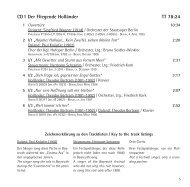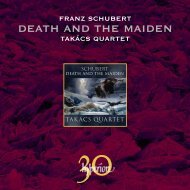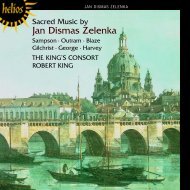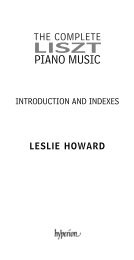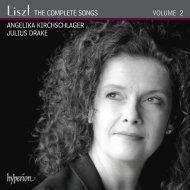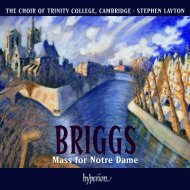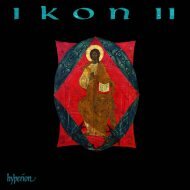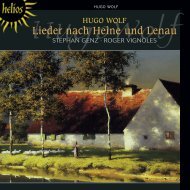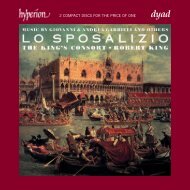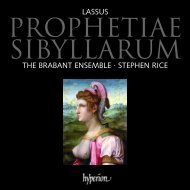CHORAL MUSIC BY JONATHAN DOVE - Abeille Musique
CHORAL MUSIC BY JONATHAN DOVE - Abeille Musique
CHORAL MUSIC BY JONATHAN DOVE - Abeille Musique
Create successful ePaper yourself
Turn your PDF publications into a flip-book with our unique Google optimized e-Paper software.
was an unwritten language. It has no alphabet or symbols<br />
and is purely reflective of their way of life. Although the<br />
language is complex for outsiders to understand the<br />
imagery can be simple and fresh as Rothenberg’s<br />
translation shows. Dove’s response is equally simple and<br />
uses a chant-like phrase which the basses sing at the start<br />
as an endlessly repeated figure which seems to reflect both<br />
primitivism and a kind of religious fervour. A second<br />
section marked ‘more alert’ and to be sung in a ‘bird-like’<br />
manner has the upper voices pecking at the words<br />
‘Beautifully joyful’. The tenors and basses join and longernote<br />
phrases bring back a feel of the chant which is<br />
properly reintroduced in the final section. This builds to a<br />
big climax and a quiet ending.<br />
Of Seek him that maketh the seven stars (1995) Dove<br />
has written that ‘the theme of light, and starlight in particular,<br />
is an endless source of inspiration for composers’.<br />
The anthem was commissioned by the Friends of the Royal<br />
Academy of Arts for their annual service in St James’s<br />
Church, Piccadilly in London, and Dove thought that these<br />
images would also have a special meaning for visual<br />
6<br />
artists. The organ part creates a musical image of the night<br />
sky with its twinkling stars which he says ‘sets the choir<br />
wondering who made them. The refrain “Seek him” starts<br />
in devotional longing but is eventually released into a<br />
joyful dance, finally coming to rest in serenity.’<br />
Into thy hands was commissioned by Salisbury Cathedral<br />
to celebrate the 750th anniversary of the canonization<br />
of St Edmund of Abingdon (1175–1240), who was Canon<br />
Treasurer of Salisbury before becoming Archbishop of<br />
Canterbury. Dove was asked for an anthem which set<br />
words of St Edmund (he actually set two prayers) which<br />
would be sung in Pontigny Abbey in France where St<br />
Edmund is buried. Of the work Dove has written: ‘Knowing<br />
that it was a very resonant building, I imagined that the<br />
echo would be part of the piece, and set the first prayer<br />
spaciously, allowing for the sound of each phrase to<br />
reverberate. The second prayer talks of pilgrimage and<br />
eternity, and the music reflects this in a calm processional<br />
which does not reach an ending, but simply, in trust,<br />
surrenders itself.’<br />
PAUL SPICER © 2010<br />
If you have enjoyed this recording perhaps you would like a catalogue listing the many others available on the Hyperion and Helios labels. If so,<br />
please write to Hyperion Records Ltd, PO Box 25, London SE9 1AX, England, or email us at info@hyperion-records.co.uk, and we will be pleased to<br />
send you one free of charge.<br />
The Hyperion catalogue can also be accessed on the Internet at www.hyperion-records.co.uk<br />
All Hyperion and Helios compact discs may be purchased over the internet at<br />
www.hyperion-records.co.uk<br />
where you can also listen to extracts of all recordings and browse an up-to-date catalogue



